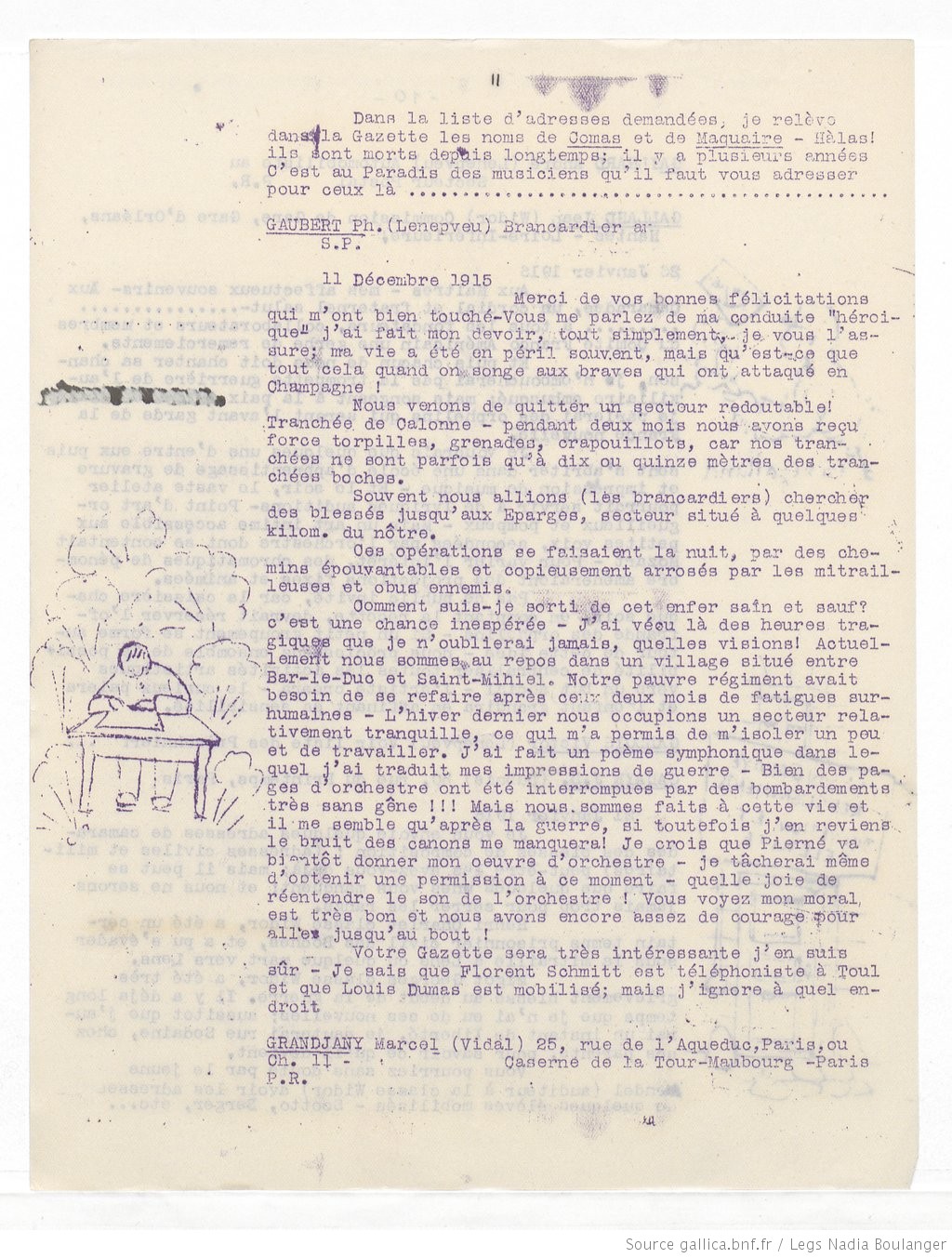Paris-Manchester 1918
Conservatoires in time of war
The ambiguity of a hero
Like many other contributions to the Gazette, this letter from Philippe Gaubert begins by downplaying his “heroism”. Stating that he was only doing his duty, Gaubert cites the esprit de corps which is the expected attitude in time of war. To be heroic is in fact to place oneself above the rest, to mark oneself out as different. Here, Gaubert wishes to be seen as one soldier among others.
However, from the second paragraph on, and especially in the third, the tone changes. As one of the “musician-stretcher-bearers, Gaubert wishes to underline the usefulness and courage of this non-combat unit, regularly criticised as a “soft job”. The “superhuman exertions” recall, without referring to it explicitly, the “heroic conduct” denied at the start of the letter.
Transcription
Note: the gaps in the text (indicated by italics enclosed in square brackets) have been filled with the help of the hand-written letter preserved in the Music Department of the Bibliothèque nationale de France, Rés Vm Dos 88 (6), folio 72.
GAUBERT Ph. (Lenepveu) stretcher-bearer in the
S.P.[1]
11 December 1915
[My dear classmate]
Thank you for your kind congratulations, which I found very touching. You described my conduct as “heroic”, but all I did was my duty and nothing more, I assure you. I have often been in danger, but that is nothing when one thinks of the brave fellows who went on the offensive in Champagne!
The sector we have just left was terrible![2] On the Calonne Road,[3] our trenches were at times just 30 to 50 feet from those of the Huns, so for two months an awful lot of shells, grenades and mortar rounds came our way.
Often, we (the stretcher-bearers) went as far as Éparges,[4],[5] a sector several miles from our own, to retrieve the wounded.
These missions took place at night, along the most frightening roads under heavy machine-gun fire and shelling from the enemy.
How did I get out of this hell unscathed? I did not think that I would be so lucky – I went through hours of tragedy that I shall never forget. Oh the things I saw! At the moment, we are on a rest break in a village between Bar-le-Duc and Saint-Mihiel. Our poor regiment needed to recover after those two months of superhuman exertion. In the winter we occupied a relatively calm sector, which allowed me to have some time to myself to work. I wrote a symphonic poem conveying my impressions of the war. The enemy had the cheek to interrupt many of the orchestral passages with bombardments!!! But we have grown used to this life, and I have a feeling that after this war, if I do come back from it, I’m going to miss the sound of cannon fire! I believe that Pierné[6] will soon be giving a performance of my orchestral work. I shall try to get some leave for that date – it would be lovely to hear the sound of an orchestra again! As you can see, I am in very good spirits, and we still have the courage to carry on to the end!
I am sure that your gazette will be very interesting. I know Florent Schmitt is a switchboard operator in Toul and Louis Dumas has been called up, but I don’t know where he has been posted
[Very happy to have received your news, my dear friend. Please accept my very best wishes
Ph. Gaubert]
[1]Secteur postal [postal sector].
[2]“:” instead of “!” in the autograph manuscript (Bibliothèque nationale de France, Music Department, Rés Vm Dos 88 [06], folio 72).
[3]Forest road linking Verdun with Hattonchâtel.
[4]A commune in the Meuse department, site of numerous major battles in 1914 and 15.
[5]No comma in the autograph manuscript (Bibliothèque nationale de France, Music Department Rés Vm Dos 88 [06], folio 72).
[6]Gabriel Pierné (1863-1937), composer and conductor.
Source
Philippe Gaubert (11 December 1915) Letter to the Franco-American Committee, in: Gazette des classes de composition du Conservatoire, No. 2, Paris, February 1916, Bibliothèque nationale de France, Music Department, Rés Vm Dos 88 (1), p. 11 [on line].
Document description: mimeographed document in violet ink, 21×27 cm.
Catalogue: http://catalogue.bnf.fr/ark:/12148/cb43639008g




